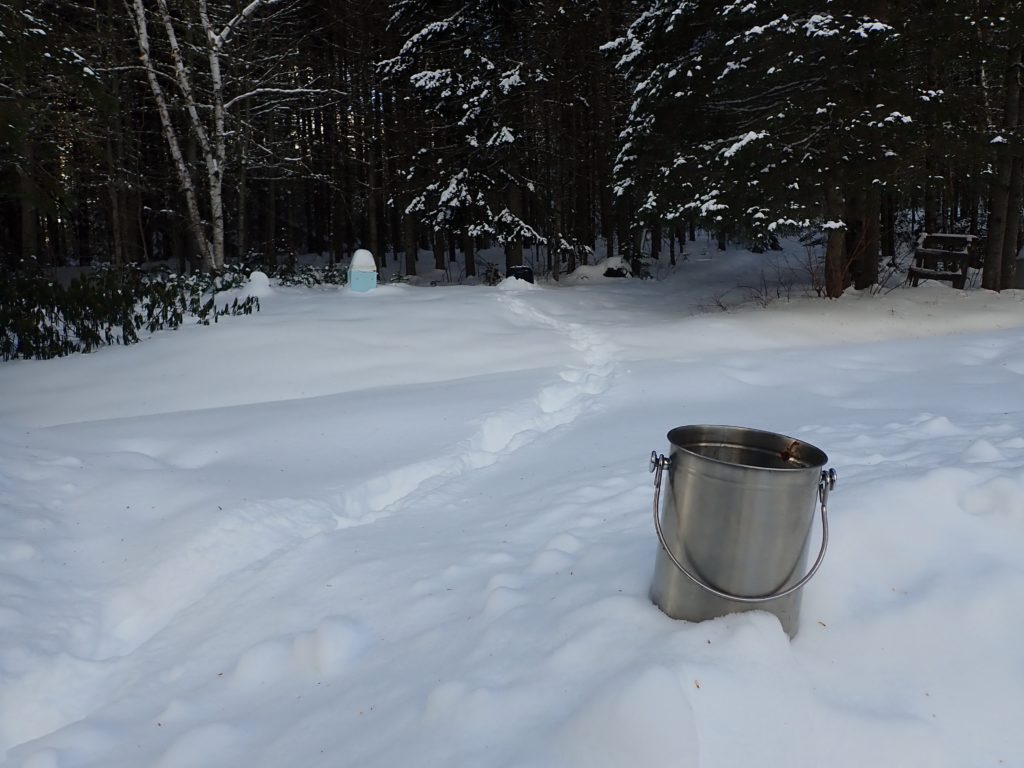In Maine winter chores are a trial by ice and snow

In his short story “One For The Road,” Maine author Stephen King penned a line that, to me, fully encapsulates winter. After getting his family stuck in their car while driving in the middle of a massive blizzard, King’s character walks for miles through deep snow looking for help. He finally ends up in a tavern with two local where at one point he hisses, “Maine,” and, in King’s words, “made it sound like a dirty word about somebody’s mother.”
I’ve never read or heard anything that comes remotely close to hitting what winter feels like so squarely on the head.
Starting in late November or early December here in Rusty Metal Farm, it just seems like everything is more difficult and takes twice as long. As if I needed a reminder, last Sunday was compost day. The first one since we had gotten our big snowfalls.
Grabbing my countertop compost can, I headed out and was immediately struck with how distant the compost bin seemed from the house than it had before the recent big snowfalls. It’s location tucked up against the treeline 200 hundred feet or so from my house on the far side of the unplowed portion of the driveway, seemed to make perfect sense when I moved it there early last summer.
But somehow, as I gazed across the glacial expanse where the driveway used to be, it was a distance that looked insurmountable. But surmount it I must. Unless I wanted to spend the rest of the winter frozen in place, clutching my full-to-the-brim compost pail. Now, I certainly could have gone back inside first and changed into more winter-friendly attire. I could have taken the time and snapped on my snowshoes. Heck, I could even have bothered to lace up my boots before stepping into the thigh-deep snow. But who has time for all that?
Instead, I took a deep breath and, while the cats and Chiclet watched from their warm perches on the inside-side of the bay window, I plunged onward. My Hudson Bay Company trapper and trader ancestors would have been proud. Did I mention it’s uphill going to the bin? And that the topography of that small portion of my yard is a favorite place for the snow to drift? It is and it does. But I made it.
Once there, I discovered an unfortunate winter-related error on my part. Because the food scraps in the pail had started to give off a tiny bit of an unpleasant odor the night before, I had set it out on the front deck. Overnight the contents froze in the sub-freezing temperatures. This led to the discovery of the inevitable: just as the contents of the pail had frozen, so, too, had the lid to the large compost bin. Right in place.
After five minutes or so of digging the snow from around the lid where it had piled up, whacking the composter with the shovel, kicking the composter, trying to loosen the lid by brute force and a lot of cussing, the lid finally came off. Unfortunately, no amount of force, threats or cussing was going to get the solid, frozen food scrap-cicle out of the pail. At this point, however, the cold became my ally. Among the scraps were some asparagus stems. One was not only loose enough for me to pull out, it was frozen solid enough to use as a sort of ice-pick. I still can’t believe it worked. But it did and the entire contents of the pail came out in a single block, which I assume will thaw in May.
Then it was back to solid land and the house. On my way, I happened to notice the bird feeder was empty and one of the suet balls had been consumed. Figuring — erroneously it turned out — I could not get much colder or wetter, I continued on to the garage for the sunflower seeds and suet stored therein.
Returning to the feeder with the suet in one hand and container of sunflower seeds in the other, I clambered over the mound of packed snow left by the snow plow, sank to above my knees in the soft snow, and made it the several yards to my destination. Once there, I dropped the suet — which immediately sank beneath the snow — and next had to scrape the snow off the roof of the bard-shaped feeder. Once that was filled, I dug through the snow at my feet and found the suet. It was then a quick matter to tie it off to the bird feeding stand and make my way back to civilization.
Meanwhile, Chiclet and the cats were still lined up in the window and I can only assume thinking they had stumbled on the best outdoor comedy viewing channel ever. I swear when I got back in three sets of critter eyes were looking at me as if to ask, “When is the next episode?”
Soon, I’m afraid, very soon. There’s a lot of cold weather to come and Stephen King, if you are reading this, by April I’m pretty sure I’ll have some new and quite color descriptions of winter in Maine if you need them.
